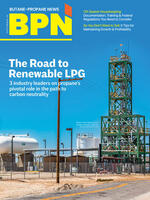
Renewable propane is coming of age not only in the propane industry, but also among vehicle fleet operators. Many of those customers have heard about renewable propane and are asking about how it might benefit their fleets compared with conventional propane and other alternative fuels. It’s crucial for propane marketers to be armed with answers when those questions surface. Why? Because questions are only going to increase, especially in the short term.
The Basics
Renewable propane, also known as biopropane, is a non-fossil fuel produced from 100% raw materials. It’s commonly produced from feedstock like animal fat, wood waste and cooking oils. Conventional propane is a byproduct of natural gas processing, petroleum and, to a lesser extent, oil refining. It’s also a byproduct of renewable diesel and sustainable aviation fuel and production.
The good news is that feedstock for renewable propane is abundant and inexpensive. Think about all the waste generated by cooking oils in just one restaurant over a year. Now multiply that by the thousands upon thousands of restaurants across the country.
There is a growing demand for renewable propane, especially among operators of school bus, truck and transit fleets. The reasons are simple: renewable propane’s virtually zero-emissions levels, dramatically reduced greenhouse gases and its ability to help meet demand for ever-cleaner products. This is especially important for fleets whose parent companies have emissions mandates.
Renewable propane supply is increasing due to substantial investments by industry stalwarts like AmeriGas Propane and Suburban Propane. For example, AmeriGas recently entered into an agreement with Global Clean Energy Holdings to produce and distribute renewable propane. Consequently, Global Clean Energy was projected to produce about 13 million gallons of renewable propane beginning mid-2022.
United States refineries in California, Texas and Louisiana have existing capacity to produce renewable propane as part of their renewable diesel production systems. Globally, production capacity at 15 processing plants, including those in the U.S., is about 100 million gallons per year and growing fast, according to the World Liquefied Petroleum Gas (LPG) Association. Right now, the cost to produce renewable propane is higher than conventional propane, but producers have instituted favorable pricing to increase adoption.
The Effect on Fleets
Renewable propane is positioned to be the next evolution in U.S. fleet vehicle fuels, because it is clean, economical and commercially available as demand increases. It can be used as a “drop-in” to conventional propane because its chemical structure and physical properties are the same. Because it produces even fewer carbon emissions than already substantially low conventional propane, renewable propane is desired by fleet operators. Consider the math:
Renewable propane has a carbon intensity as much as four times lower than conventional propane and five times lower than diesel.
Renewable propane made from raw, used cooking oil has an average carbon intensity score of 30. By comparison, conventional propane has a carbon intensity of 83; diesel, 95; and gasoline, 96.
Renewable propane’s carbon intensity can get as low as 20.5.
It’s no wonder, then, that fleet operators can see the potential of renewable propane, compared to not only conventional propane but also biodiesel and even electricity, which is proving expensive to adopt, especially for school bus fleets. Plus, electric vehicles are touted as zero emissions, which is true when you only consider what comes out of the tailpipe. When you take into account where electricity comes from, the emissions are not zero.
Renewable propane can also propel fleets and their parent companies into a much more robust contributor to reduced emissions. It increases an organization’s environmental social governance (ESG) score because it lowers carbon intensity so dramatically. A lower ESG score means increased prices and impacts everything from day-to-day operations to stock price. Renewable propane helps mitigate this and creates a situation where it could have a real impact on not only environmental considerations, but economic as well.
Increasing Demand
As greater supply of renewable propane becomes available, fleet operators will be able to easily implement renewable propane into their own propane vehicles, as it can be used in any existing propane engine and propane infrastructure.
On the West Coast, U-Haul purchased its first million gallons of renewable propane in 2020, and in 2021 added another million gallons to sell at its California stores. On the East Coast, the state of Virginia received its first gallons of renewable propane in 2021 to fuel police vehicles and buses in Petersburg.
That’s a lot of renewable propane, but the question is will it scale to make a real impact on a company’s — and the nation’s — carbon footprint? The National Propane Gas Association (NPGA) says yes.
NPGA notes that because renewable propane today is created as a derivative of renewable diesel, it will mirror the scaling of that fuel. According to estimates from U.S. Environmental Protection Agency data, roughly 900 million gallons of renewable diesel were used in the U.S. in 2019. Most of it was used in California because of the economic incentives from that state’s Low Carbon Fuel Standard. But often states take their cue from California, which means national scaling is a distinct probability.
Undoubtedly, the Propane Education & Research Council will aid in scaling because it is committed to testing renewable propane, including blends with conventional propane, along with standard development. It has been informing original equipment manufacturers (OEMs) of potential engine use and creating awareness of the fuel for producer, seller and end user.
Fueling Infrastructure
According to Superior Energy Systems, a midstream company, renewable propane doesn’t need changes to the existing nationwide delivery infrastructure for one simple reason: renewable propane is exactly the same chemical formula as conventional propane — C3H8.
Jim Bunsey, director of operations for Superior Energy Systems, says there is a misconception both within the industry and outside of it that renewable propane is chemically different than conventional propane. Not true — though some of the company’s customers are choosing to keep renewable propane in separate tanks on their sites merely to educate their potential customers about the differentiation in feedstocks.
The benefits of renewable propane are many for fleets, Bunsey says, such as the dramatic reduction of carbon intensity scores, especially important in states like California. New carbon intensity requirements via the California Air Resources Board are expected in the near future, and as far as infrastructure goes, the transition should be seamless.
The Future
According to the National Renewable Energy Laboratory, potential demand for renewable propane in California could surpass 200 million gallons by 2030. Most, if not all, will be American-made. That’s crucial, because fleets can tout the fact that they are using a virtually 100% domestic fuel, not encumbered by the uncertainty of pricing and geopolitics present with gasoline and diesel. The initial push for renewable propane has been robust and should only grow. California-based AltAir is coproducing renewable propane, while making commercial-grade renewable jet fuel. The company is exploring the potential to recover renewable propane for medium-duty vehicles equipped with newly certified low-nitrogen-oxide engines.
Propane marketers are at the nexus of the renewable propane equation. They now have answers for customers who ask about the fuel and are in position to sell more as it becomes available. Marketers who do their part will be able to increase sales with renewable propane.


